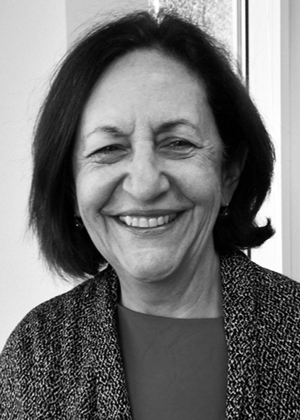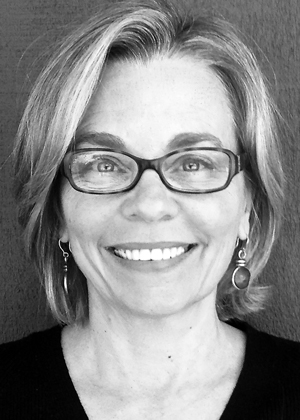Citation
As program directors at the National Science Foundation (NSF) in the Division of Earth Sciences for the last 20 years, Robin Reichlin and Sonia Esperança have played an exceptionally important role in advocating for, nurturing, and supporting the research community in solid Earth sciences, through combined efforts in their respective fields of specialty (geophysics and geochemistry and petrology). They have achieved an unprecedented level of respect and admiration, as well as confidence and trust, from a highly discerning and typically critical research community.
By carrying out their responsibilities as program directors with outstanding dedication, they have provided leadership for geochemistry and geophysics, exercising deep understanding of research quality and frontiers. Moreover, working as a team, Robin and Sonia have been instrumental in the development of key multidisciplinary infrastructure for geosciences that has changed the way in which we conduct our research. They have looked for ways to make new programs happen in the context of planning within NSF, often within a restricted fiscal climate, and have promoted workshops and meetings to refine the goals to make the cases convincing. In many situations, they have identified new research opportunities and laid the groundwork for new programs even before most of the research community was fully aware of them.
Examples of programs they have helped happen and sustain, among others, are Cooperative Studies of Earth’s Deep Interior (CSEDI), Cooperative Institute for Dynamic Earth Research (CIDER), Computational Infrastructure in Geodynamics (CIG), Consortium for Materials Properties Research in Earth Sciences (COMPRES), and Meeting of Young Researchers in Earth Sciences (MYRES). Notably, they have played an important role in establishing the Frontiers in Earth System Dynamics program (FESD). The stewardship of these important programs and their many other community activities have benefitted a large segment of the Earth science community. Clearly, many individuals at NSF and in the community have helped all these programs come to life and be sustained. However, Robin and Sonia’s contributions stand out for their exceptional ability to communicate with the community and help researchers articulate their needs, as well as identify the highest and scientifically most worthy initiatives, embrace them, and advocate for them at NSF.
In summary, Robin and Sonia have sustained excellence in NSF’s geoscience programs and tirelessly advocated on behalf of the Earth sciences research community to develop new programs and open up new research opportunities. The Flinn Award is a fully deserved and modest recognition of their contributions.
—Barbara Romanowicz, University of California, Berkeley
Response
We are deeply honored to be the co-recipients of the 2015 Edward A. Flinn III Award, and wish to thank the American Geophysical Union (AGU) awards committee, and our Earth sciences community colleagues for this recognition. We are proud to join a group of outstanding awardees that has worked on behalf of the geosciences, including one of our mentors at NSF, Daniel Weill. Dan showed us how to be effective advocates for the novel research of the community within the NSF. We are also excited to share this award because early on we recognized that through a close partnership, we could best promote new facilities and research directions. The rapid advance of the frontiers of solid-Earth geosciences has sustained us through the many hurdles and setbacks along that path. We have shared a passion for the science, the people engaged in research, and a vision for a comprehensive, integrated understanding of the physical and chemical functioning of the Earth. We were lucky to be supported at home by our husbands, Steve Bohlen and Rick Carlson, who understood our determined minds and respected our devotion to promoting the health of our communities. We also shared being mothers to our children, Jesse, and Taylor, Hunter, Annie, and Sallie, and the tough decisions made to balance career and life, giving us an appreciation for similar issues faced by a new generation of scientists.
Among the many rewards of fighting for new science and the funding to support it are the opportunities to work closely with many of the greatest minds and visionaries in the field, and to watch the development of students who have grown and emerged as new leaders in the geosciences. We are fortunate to have had the opportunity to nurture emerging ideas and technologies that have paved the path to new understanding, and to view the research community and their science from a synoptic viewpoint. The joy is in looking back over 20-plus years to see the enormous growth in the breadth, sophistication, and integration of solid-Earth science and how every discovery benefits knowledge and society.
Though recognized as individuals, we know that it is the concerted and persistent efforts of many that bring success. We are but two members of a team of program directors united in a passionate desire to facilitate understanding of the beautiful mysteries of the Earth. We feel deeply fortunate to have played a part. Thank you.
—Sonia Esperança and Robin Reichlin, National Science Foundation, Arlington, Va.
Citation: AGU (2015), Sonia Esperança and Robin Reichlin receive 2015 Edward A. Flinn III Award, Eos, 96,doi:10.1029/2015EO042473. Published on 31 December 2015.
Text © 2015. The authors. CC BY-NC 3.0
Except where otherwise noted, images are subject to copyright. Any reuse without express permission from the copyright owner is prohibited.


